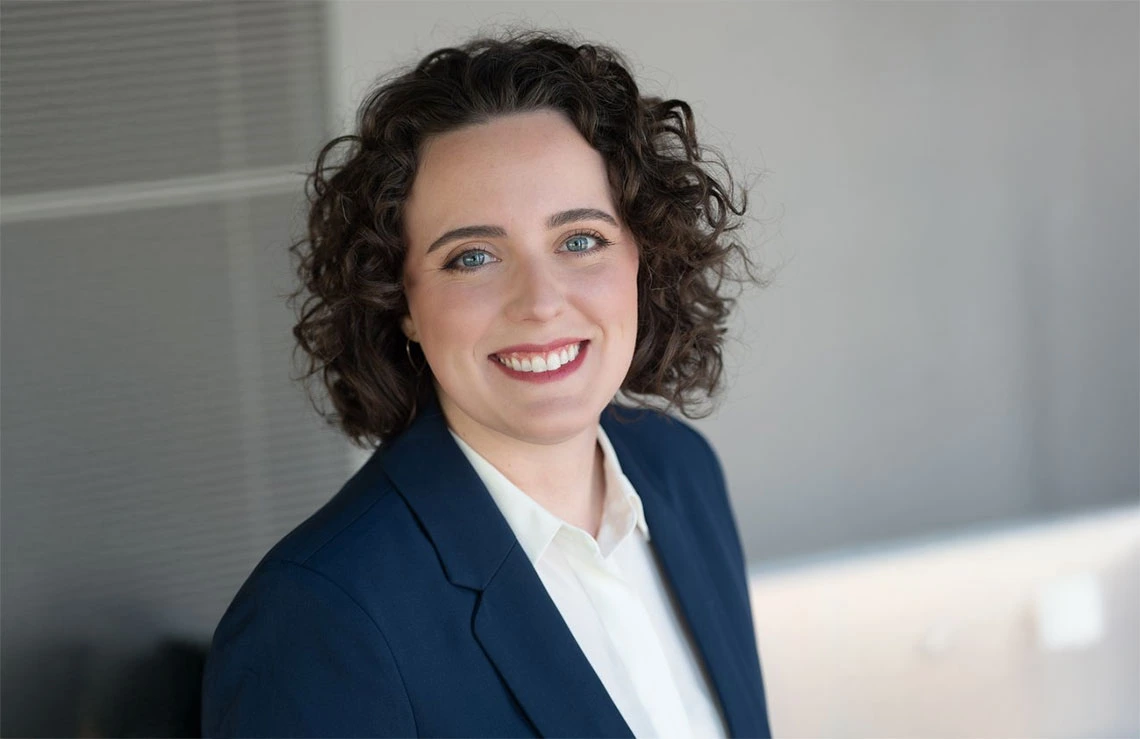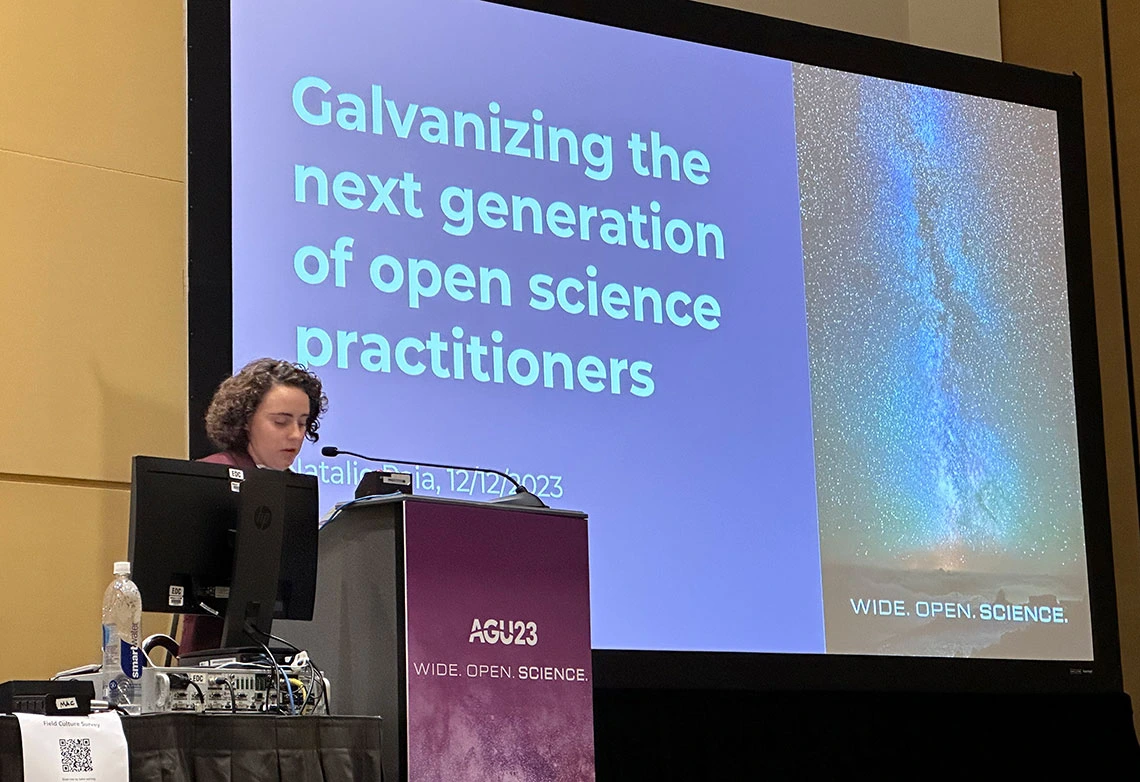Bridging Earth, Data and Discovery: InfoSci Postdoc Natalie Raia Joins the American Geophysical Union Board of Directors

Natalie Raia, a postdoctoral scholar at the College of Information Science, has been named a member of the American Geophysical Union Board of Directors.
For Natalie Raia, the act of scientific discovery doesn’t end with the field expedition or lab results. It extends into something less visible but equally vital: ensuring that the physical samples and data collected today remain usable, accessible and ethically stewarded for generations to come. A postdoctoral scholar at the University of Arizona College of Information Science, Raia stands at the intersection of earth science and information science—a place where geochemical samples meet metadata standards, and user interfaces shape scientific possibility.
This January, Raia began a new chapter in that work when she joined the Board of Directors of the American Geophysical Union (AGU), one of the largest and most influential scientific societies in the world. AGU supports more than half a million earth and space scientists globally, and its leadership plays a key role in shaping how science is shared, governed and communicated. For Raia, the appointment is both a recognition of her interdisciplinary expertise and an opportunity to scale the impact of her work on a global stage.
From Samples to Systems
Raia describes her research as driven by the question of how scientists discover, share and reuse physical samples and datasets—especially in the increasingly digital and collaborative context of global science. Her work focuses on building knowledge infrastructures: the people, technologies and policies that allow data to flow and science to thrive.
“A geoscientist by training, I work to increase the discoverability, use and curation of scientific sample collections and data for future generations of scientists and the public,” she says. Her background in geochemistry gives her an intimate understanding of the bottlenecks and blind spots scientists face in navigating today’s fragmented data landscape. “There is urgency here,” she says. “Our ability to prepare for and respond to ongoing environmental changes and climate challenges is directly tied to our ability to find, access, share and reuse data.”
That perspective makes her uniquely suited to serve on the AGU Board of Directors, where decisions about publishing, open science and community resources carry weight across disciplines and borders. It’s also a full-circle moment: Raia first joined AGU in 2015 as an undergraduate presenting her research, and has since contributed to the organization in multiple roles—most recently as a Voices for Science Policy Fellow and a key contributor to AGU’s policy position on scientific data as a form of world heritage.
“These prior service activities with AGU have bolstered and informed my research at the College of Information Science,” she says. “I am personally excited to bring interdisciplinary, open science-focused expertise to my tenure on the AGU Board.”

Postdoctoral Scholar Natalie Raia presents on "Galvanizing the next generation of open science practitioners" at AGU23, the international annual conference of the American Geophysical Union.
Data, Metadata and the Human Layer
In her current postdoctoral work, Raia studies how scientists interact with digital data infrastructures—specifically, how they search for and assess the reusability of physical samples. Working alongside her mentor, Associate Professor Andrea Thomer, she uses semi-structured interviews and user experience methods like “think alouds” to better understand the human layer behind data systems.
Her research ranges from mapping the data-sharing habits of researchers studying the recent geologic past to developing practical guidelines for archiving sample metadata and citing persistent identifiers. The work is deeply collaborative, involving librarians, engineers, publishers and scientists across disciplines—and is motivated by a conviction that good data stewardship is a cornerstone of good science.
“The interview data is exceptionally rich,” Raia says of her current projects. “It has been both a challenge and extremely rewarding to begin to pull out common threads from our 35+ interviews—especially for this former geochemist!”
She’s also pragmatic about the structural challenges scientists face. While principles like FAIR (Findable, Accessible, Interoperable, Reusable) are widely embraced in theory, in practice, many researchers lack the training or resources to meet them. Bridging that gap is a key part of Raia’s mission—and her AGU board role gives her a new platform to advocate for change.
Learning the Art of Leadership
Joining the AGU Board at this stage in her career is not only an honor but a vital learning opportunity, Raia says.
“It is a privilege to serve alongside other directors, many of whom have had esteemed science careers and who also hold leadership positions in the higher administration of their respective institutions,” she says. “Perhaps most of all, getting to work with and alongside exceptional AGU staff partners to help steer the strategic direction of AGU is a joy. Getting to learn from their expertise and professionalism is a privilege.”
Already, the experience has reshaped how she thinks about leadership and collaboration. The lessons she’s gleaning—on governance, soft skills and building high-functioning teams—are informing her day-to-day work in research settings and expanding her horizons for future career paths.
“This position also gives me elevated exposure within AGU’s membership, which is exceptionally helpful at this stage of my career,” she says, noting the unique blend of disciplinary training and applied experience she’s gained in information science.
A Time of Change
Her appointment also comes at a moment of deep uncertainty in U.S. science funding, as researchers contend with shifting political priorities, tightening budgets and a growing demand for global collaboration.
“I think we will see (and are already seeing) heightened need for collaboration with the U.S. private and philanthropic sectors,” she notes. “Simultaneously, I think the next few years will demand increased collaboration with international partners.” For researchers, this means stretching outside their traditional networks—and, in Raia’s view, bringing library and information science into places it hasn’t traditionally been, but is urgently needed.
There’s a humility in how Raia talks about the challenges ahead, especially from the vantage point of a postdoctoral scholar. But there’s also a clear sense of purpose: to make science not just more open, but more usable, ethical and enduring. “In the spirit of ‘flexing,’ we can also see this as an opportunity,” she says.
For AGU and the global science community, Raia’s blend of technical insight, interdisciplinary thinking and deep commitment to service are exactly what’s needed to meet this moment.
Learn more about research at the College of Information Science, or explore ways to connect with the college on research, industry collaboration and more.

